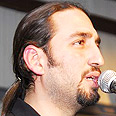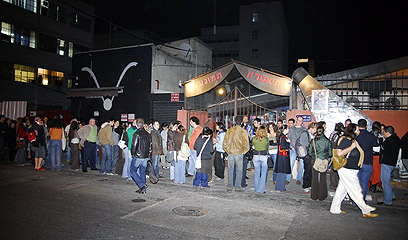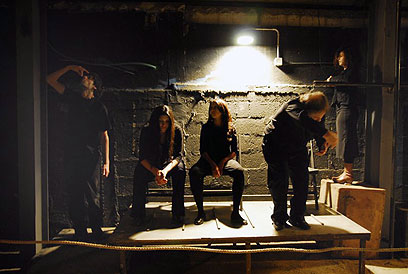
Holocaust remembrance of a different kind
Alongside the traditional events, alternative ceremonies are the new trend. Some are sponsored by mainstream institutions like Haifa municipality and the Hebrew University. How did the alternative turn mainstream and become part of it? What does it say about our memory?
This year, several hundred people, of all ages and from all over Israel, attended the event at Tmuna Theater; an event that has become a model for a growing number of similar ceremonies. Even vehement condemnations by public figures like former Justice minister, Tommy Lapid, who claimed that such events were contemptuous and a bad joke at the expense of Holocaust survivors, have faded away.
So much so that alternative ceremonies are now attracting Holocaust survivors as well as public figures. Though too early to declare the events as becoming part of the norm, there is no doubt that these events are gaining popularity.

Waiting in line at Tmuna Theater (Photo: Niv Calderon)
Different dialog
So, what has led to the change? Where does this hunger for “alternative” remembrance events stem from? How did the alternative become part of the establishment? And how will the establishment manipulate these events? These questions worry the people behind the alternative events.
“The fate of every opposition event is to turn ordinary,” says Avi Gibson, Tmuna Theater director. “Even Freud, Einstein, and Moses with his monotheistic religion turned mainstream eventually. It’s a natural process. When Haifa municipality asks us to produce the alternative ceremony, as far as I’m concerned, it says that the establishment understands the need for another kind of dialog,” he adds.
Nine years ago, the establishment vehemently opposed the trend, some deemed it dangerous and said that it was a disgrace to the memory of the Shoah. What led to the change?
“When the establishment cannot fight an alternative trend, it commandeers it. In recent years, we have seen people from the conservative establishment attending the ceremony at Tmuna, the same people who said they would never step into such ceremony. Some didn’t agree with the material, others found it interesting, but everyone enjoyed interacting with the younger generation. I think that this led them to recognize that they can’t escape change.”
For Gibson, no small revolutionary in spirit, the establishment hug is difficult. “The fear is that due to social recognition and acceptance, the ceremony will lose its oppositional power,” he admits.
But he insists that the alternative ceremony still has a purpose. “I don’t think, for example, that in state ceremonies they will mention that Israel has no privileged rights over the Holocaust. Those contents will be censured.”
How can the establishment create an alternative? Is it its role at all?
“In my view," says Carmit Jacobson, head of Haifa municipality's culture department, "the state and the alternative ceremonies should co-exist. The two dialogs are necessary and we must comprehend that as we part with more and more survivors, it may be that the balance between managing the past and managing the present will change."
Her department produces two events at the same time. The traditional ceremony "overflows with remembrance and includes the lighting of torches by survivors, poetry and Holocaust accounts. The second, on the other hand, takes a view on us; those who live here now and are still influenced by the Holocaust. This is a necessary pyschological treatment that allows us to better understand the paths of history and ourselves.
"If I could initiate this alternative dialog, in addition to the acceptable ceremonies in the education system, I would, without hesitation. It is as important as going to psychologist. By adopting the alternative to the establishment, we make room for the next thing to occur,” she says.
Gibson agrees: ”I’m hoping that in 20 years there will be other alternative ceremonies to ours. If this does not happen, I will be very worried.”
Siren or no siren, the Holocaust is part of me
The Hillel House in the Hebrew University in Jerusalem hosted an alternative ceremony for the fifth time, officiated by Lior Halperovitch, a history student, Holocaust researcher, and a book critic for TimeOut.
“Throughout the years Israel has allowed only one way of remembrance, but memory-shaping undergoes change,” he says giving the example of Yehuda Poliker’s album, “Ashes and Dust”. “
When the album came out 20 years ago, everyone thought that it commercialized the Holocaust. People didn’t accept the idea that personal memory could be manifested through rock music. Today it is considered a creation of immense proportions, but this was a revolution that started from the underside by the second generation that realized that it’s allowed to mourn its childhood by means familiar to them.”

Scene from ceremony at Tmuna Theater (Photo: Niv Kalderon)
The ceremony in Jerusalem is aimed at continuing Poliker’s path and lead the participants to self- expression. “Whether I stand still during the siren or not, the Holocaust is part me. Whether I visited Poland or not, I have plenty to say on the subject since I carry with me the fears and the burden of traumas of my father and grandfather. The memory is inherent, and when I was told at home that ‘nothing scares us because we fought the Nazis’, it turns the Holocaust into my own personal story”, says Halperovitch.
Initiating an alternative Holocaust ceremony at a university considered the elite of Israeli academia was not an easy task, and dictated a low-key, humble ceremony. “You cannot make nonsense in Jerusalem,” he says. “The first year I received angry letters from the Wiesenthal Center and from Yad Vashem, writing me, how dare I make an event that supposedly deals with Holocaust remembrance and turned it into a mockery. I accepted the criticism lovingly because I knew I was doing something important. The ceremony was electrifying and it was the first time I saw people crying on Yom Hashoah."
Shahara Blaw, founder of the Tel Aviv event, seconds this. “The chronological distance from the war allows us to be daring, and examine the influence of the Holocaust, not in surgical manner but still, with less anxiety. The big unknown is what will happen to the memory when the last survivor is gone – erasing, repressing, dissolving, and distorting the memory. Or an even more frightening option that could arise because of fear of forgetting, would be a despotic rule that will pave the true way to remember, but forbid anything that is not mainstream”, she says, mentioning the legislation that forbids the use of the Holocaust for political gains, after the evacuees of Gush Katif displayed an orange patch at the beginning of the disengagement from the Gaza Strip.
Blaw has been working for several years at the Institute for Holocaust Studies in Haifa. Through her daily work she felt the distance and detachment the Holocaust evokes in Israeli youth and searched for a solution. “The alternative ceremonies examine the myths we grew up on and cling to; they provoke thinking and raise questions. It’s an active and demanding listening to issues relevant to our lives and I think that this is what prompts people to attend. Clinging to memory is no longer sufficient. Today’s generation wants to confront.”
Are there any red lines? Taboo Issues?
“In my view the Holocaust is not something that cannot be touched. I can understand using the Holocaust, even when the use is flawed. I don’t like those who say that you can’t compare. It's the opposite. When you compare, you witness similarities but also differences. You can’t treat the Holocaust as a dead corpse. It is our inheritance. The Holocaust was caused by human beings. It was the biggest laboratory in the world for human behavior. I’m hoping that we never have to redo this experiment, but if we ever do, we must learn from it and exert it on our reality.”










